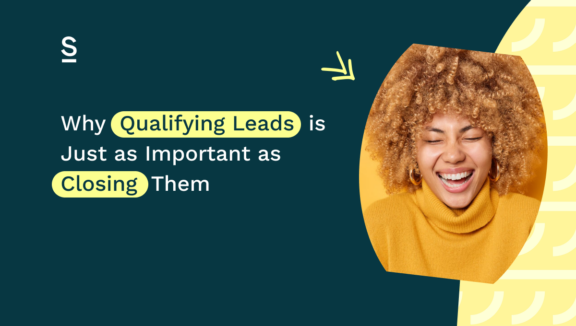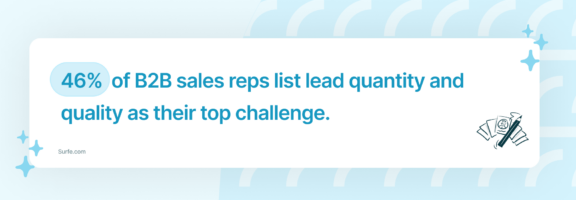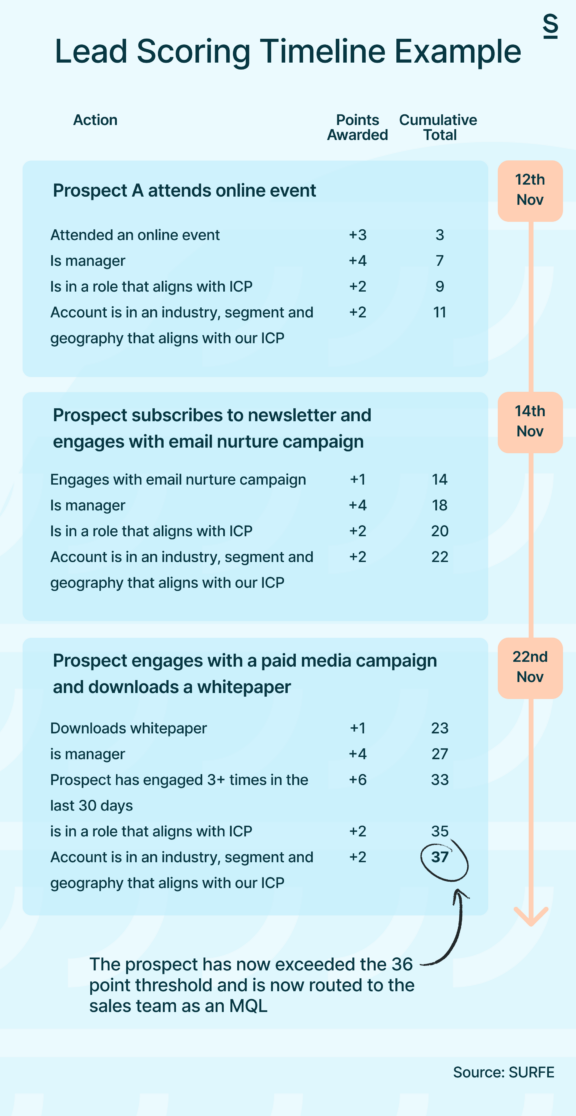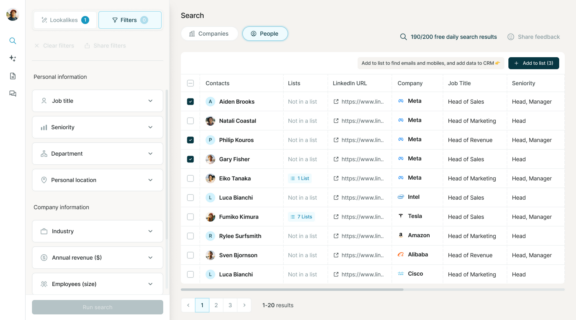Why Qualifying Leads is Just as Important as Closing Them

Are you familiar with the phrase “It’s not about the destination, it’s about the journey”?
Be honest – you think it’s wrong, don’t you?
As a sales professional, it can be easy to scoff at wisdom like this. After all, our performance (and our paychecks) are judged on outcomes, not how much we enjoy moving a prospect down the funnel or how much we personally grew from dealing with that really, really difficult prospect last month.
Here’s a thought: what if the journey could make the destination even better?
Let’s take lead qualification as an example. On the surface, it might seem like something that’s less important than closing a deal – like we said, you’re only being judged on one of those things, right?
Not quite. Here’s the thing: qualifying leads effectively makes sure you’re investing your time in the right prospects – which improves the overall success rate of the deals you close. We’re going to dig into the what, why, and how in this blog post:
- The Link Between Lead Qualification and Sales Success
- Key Components of Effective Lead Qualification
- Why Poorly Qualified Leads Can Harm the Sales Process
By the time you’ve finished reading, you’ll have a strong qualifications process and better customer relationships – which, spoiler alert, leads to more deals closing. Exactly what you wanted in the first place, right?
The Importance of Lead Qualification
Ok, we all know we should be qualifying our leads – but what does this actually mean in practice?
Simply put, a lead is qualified if they 1) fit your Ideal Customer Profile (ICP) and 2) are ready to engage with your product or service.
Qualify a lead properly, and you’ll:
- Save time by focusing on high-potential prospects
- Align sales efforts with the right target audience
- Stop wasting resources on uninterested or unfit prospects
Woah – that was easy. Onto the next: the link between qualifying leads and being successful at sales.
The Link Between Lead Qualification and Sales Success
Did you know that a whopping 67% of lost sales are due to sales reps not properly qualifying leads?
Qualified leads are more likely to convert into customers, as they already fit into a business’s ICP. Proper qualification also speeds up the sales process by reducing time spent on unproductive leads.
Remember, even if a lead isn’t qualified now – because, for example, they’re waiting for funding or they’re not quite big enough to get full value out of your product – they may be in the future. Companies that are really, really good at lead nurturing generate 50% more sales-ready leads because they expertly nudge their leads along into being qualified. Now that’s clever stuff.

Key Components of Effective Lead Qualification
Ok, so we now know what lead qualification is and why it leads to sales success. But how do we go about doing it?
The short answer: there’s no right or wrong way. What works for your business might not work for another. That said, most companies use some or all of the below as part of their process:
Lead scoring: lead scoring is when you assign a value, like a numerical point to a lead. How many points a lead gets might be based on different traits – the information they’ve passed on to you or what content and webpages they’ve engaged with, for example. Lead scoring is pretty popular stuff – 44% of companies use it to prioritize leads.
Asking the right questions: you could have a lead that looks like your number 1 dream prospect in the entire universe, but if they don’t have the budget, the ability to make a decision or a timeline in place, they’re not well-qualified.
Behavioral signals: how prospects behave is a biggie. Are you always having to chase down a prospect for a call, or remind them to read the proposal you sent, or are they calling with questions about that piece of content buried deep in your website?
Segmenting leads: while you want your prospects to show you how qualified they are, you’ll have to nudge them in the right direction. Segmenting leads is a great way to do just that: tailor your communications to different profiles, and they’ll be far more likely to respond now or later down the line.
Have a look at a very basic lead scoring template below 🙂

Why Poorly Qualified Leads Can Harm the Sales Process
There’s no getting around it: qualifying leads does take extra time. Which, as a sales pro, we’re sure you don’t have loads of anyway.
We get you – but where you can, you should make it a priority. Here’s what not qualifying leads can lead to:
Wasted time and resources: 37% of sales reps spend more than half their time prospecting. How would you feel if we told you you were spending more than half your time on leads with little chance of converting?
Low morale: we’ve all been there. You think you can’t get any more rejections in one week – and then five more come up in a single afternoon. While most of us can bounce back from a situation like this once in a while, experiencing rejection again and again gets very demoralizing, very quickly.
Ineffective sales funnel: pass along an unqualified lead, and you’re basically passing the buck. Those working further down the funnel will just have to deal with the same wasted inefficiencies as you.
Lead Qualification Tools and Techniques
Remember when we spoke about how lead qualification does take extra time?
(If you don’t – come on, it was literally the last paragraph).
The point still stands – but it doesn’t mean that you can’t use some handy tools and techniques to help you:
CRM systems: whether you’re a Salesforce pro or a Google Sheet type of person, CRM systems help you track and manage all the leads you’re qualifying.
Automated lead scoring: businesses like HubSpot have lead scoring tools that can do all the hard work for you – magic.
Social selling: using social platforms like LinkedIn or Twitter can help you find insights about prospects. For example, if they’re commenting stuff like “Wow!! Amazing product” on your latest BOFU LinkedIn post, you might be onto a winner. You can also use these platforms to nurture prospects who aren’t quite there yet.
Prospecting tools: there’s this cool tool called Surfe (nope, promise we hadn’t heard of it before researching this blog post) that helps you pinpoint companies that fit your qualification criteria. It has really advanced search capabilities which let you filter a big database down to super-relevant businesses. Bonus: once you’ve found 5 companies that look good, you can use the ‘Company Lookalikes’ feature to pull up a list of even more companies with the same criteria.
Once you’ve got your list, Surfe will automatically populate it with accurate email addresses and phone numbers – so you can get in touch and quickly finish qualifying yourself.

The Role of Qualifying Leads in Long-Term Sales Success
By now, you’re hopefully fully on board with qualifying the heck out of every lead that comes your way. Do this, and you’ll reap the rewards – which go beyond closing more deals, by the way:
Lasting relationships: think about the difference between an unqualified lead who gets pushed through the sales process, and a qualified lead who practically carries themselves through to a sale. Who’s more likely to become a loyal customer? Enough said.
Customer satisfaction: the more qualified your lead is, the more you’re going to be able to help them. And customers who have a personalized, relevant experience are going to be more satisfied and want to stick around for longer.
Sustainable sales growth: qualifying leads makes sure that your sales funnel is consistently filled with high-quality prospects. And if you consistently have high-quality prospects to sell to, you’ll have predictable, repeatable growth. Simples.
Let’s Wrap It Up!
If we had to sum up this blog post, we’d say one thing: focus on quality, not quantity.
Qualifying leads is not just ticking a box: it’s a vital aspect of the sales process that will directly impact your closing rates.
Invest more time and effort in lead qualification, and you’ll also see better long-term results and build strong customer relationships. In other words, your professional life’s about to get a lot sweeter.

Qualifying leads is really, really hard without Surfe*
*Ok, you might manage without. But it’s certainly going to make your life 10x easier. Try it – for free, obvs.
FAQs About Why Qualifying Leads is Just as Important as Closing Them
What Are the Benefits of Qualifying Leads Before Closing a Deal?
When you qualify a lead before closing a deal, you’re making sure that they genuinely need your product or service. The benefits of qualifying a lead properly include:
- Faster sales cycles
- A motivated team
- Time and resources saved
- Improved customer relationships
- Higher retention rates
How Does Qualifying Leads Improve Your Sales Conversion Rate?
You can think of a qualified lead as one that ticks all the boxes: they’re aligned with your ICP, they have the budget and the decision-making prowess, and they’re actually interested in your product. And with every box ticked, you get closer to a sale. Simple. When you qualify a lead properly, you’re also saving yourself – and other members of your team – time they may have spent on a business that’s not a good fit. Time that (wink wink) can be spent on businesses that are a good fit.
What Criteria Should You Use for Qualifying Leads Effectively?
The exact criteria you should use to qualify a lead will depend on your unique business, but commonly used lead qualification criteria include:
- Lead scoring: when you ‘score’ a lead based on certain traits or attributes – like the amount of times they’ve engaged with your content, or whether they’ve told you they’ll be in-market next quarter.
- Asking the right questions: making sure your prospect has the budget, signoff, and timeline is essential.
- Behavioral signals: do you feel like they’re not super interested, or are they practically begging you for a call?
Use these criteria to figure out if a lead is worth your time, right now – or if they should be sent to nurture.
How Can Qualifying Leads Streamline Your Sales Process and Boost Revenue?
Qualifying leads can be thought of as greasing the pole you have to slide down to reach a sale – it makes the sales process easier and faster. When you’re only working with qualified leads, you’ll consistently make more sales – which leads to boosted revenue over the long time.
How Can Qualifying Leads Help Prioritize Sales Efforts for Maximum Results?
Qualifying leads helps you direct your energy towards the leads who are most likely to buy, right now – while seeing who’s coming up ahead, too. Conversely, if you don’t qualify your leads you could spend an equal amount of time on a lead who has no interest in buying your product and a lead who’s desperate to make a purchase as soon as they can. The more effectively you prioritize your leads, the more efficient you’ll be and the more you’ll see your revenue grow.


